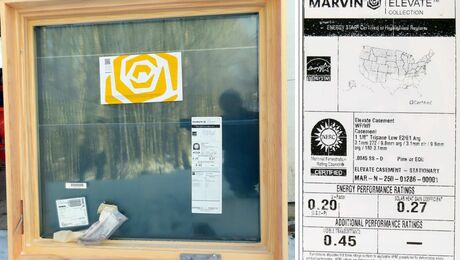ABS drain pipe
wjrobinson
| Posted in Green Products and Materials on
What is there to know about ABS drain pipe since PVC has environmental issues? Also is the ABS going to last a hundred years or longer?
GBA Detail Library
A collection of one thousand construction details organized by climate and house part
Search and download construction details









Replies
AJ,
To answer your question, I'll quote from two Environmental Building News stories.
"Piping in Perspective: Selecting Pipe for Plumbing in Buildings," EBN, vol. 216, no. 4: "ABS is a lightweight, durable black plastic pipe commonly sold alongside PVC. With the proper solvent cements, these two materials can be joined using standard fittings. Like PVC, ABS is rigid, durable, and resistant to corrosion. It can be recycled, but not easily, and, as with other piping plastics, little infrastructure exists to recycle it. Since ABS resin can be fairly expensive and manufacturers have been known to mix in inferior grades of resin, buyers of ABS should take care to purchase pipe from reputable suppliers, and, since some ABS pipe is susceptible to UV damage, users should avoid exposing it to sunlight during construction.
"In some categories in USGBC’s PVC report, including total noncarcinogenic human health impacts, PVC outperforms ABS. However, ABS performs better overall in the report than PVC, consistently achieving better marks than both PVC and cast iron pipe in environmental and human health impacts."
"Should We Phase Out PVC?", EBN, vol. 3, no. 1: "Widely used for waste-drain-vent pipe in houses, ABS or acrylonitrile-butadiene-styrene offers few if any advantages over PVC. ABS resin is lighter than PVC but energy-intensive to produce and more than twice as expensive (as a resin). ABS also has nearly twice the thermal expansion of PVC, and its chemical components, while perhaps not as damaging to the environment as PVC’s, are hardly innocent bystanders, either.
"Because ABS pipe must be cost-competitive with PVC even though the resin is a lot more expensive, profit margins in ABS pipe manufacturing are smaller. This leads to cost-cutting shortcuts and material substitutions by manufacturers—sometimes with terrible results. Substitution of low-grade recycled ABS resin for virgin resin by a handful of ABS pipe manufacturers on the West Coast during the 1980s is resulting in catastrophic failure of piping in thousands if not hundreds of thousands of houses."
So for now there is no best green material. I will stick with pvc to ensure a quality job. Thank you for the very informative post Martin.
Yes, very interesting indeed. In my limited experience w/ PVC on rowing frames for my rafts, and pieces sitting in my unheated garage for years, it tends to get brittle and crack easily after several years. ABS does not seem to be as effected. It would be interesting to get info on the cryogenic properties of each.